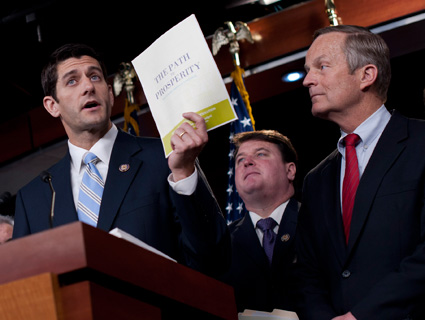This story first appeared on the TomDispatch website.
I still don’t know why Sallie and I bothered to go to that party in the forest slope above Aspen. The people were all older than us and dull in a distinguished way, old enough that we, at 40ish, passed as the occasion’s young ladies. The house was great—if you like Ralph Lauren-style chalets—a rugged luxury cabin at 9,000 feet complete with elk antlers, lots of kilims, and a wood-burning stove. We were preparing to leave, when our host said, “No, stay a little longer so I can talk to you.” He was an imposing man who’d made a lot of money.
He kept us waiting while the other guests drifted out into the summer night, and then sat us down at his authentically grainy wood table and said to me, “So? I hear you’ve written a couple of books.”
I replied, “Several, actually.”
He said, in the way you encourage your friend’s seven-year-old to describe flute practice, “And what are they about?”
They were actually about quite a few different things, the six or seven out by then, but I began to speak only of the most recent on that summer day in 2003, River of Shadows: Eadweard Muybridge and the Technological Wild West, my book on the annihilation of time and space and the industrialization of everyday life.
He cut me off soon after I mentioned Muybridge. “And have you heard about the very important Muybridge book that came out this year?”
So caught up was I in my assigned role as ingenue that I was perfectly willing to entertain the possibility that another book on the same subject had come out simultaneously and I’d somehow missed it. He was already telling me about the very important book—with that smug look I know so well in a man holding forth, eyes fixed on the fuzzy far horizon of his own authority.
Here, let me just say that my life is well sprinkled with lovely men, with a long succession of editors who have, since I was young, listened and encouraged and published me, with my infinitely generous younger brother, with splendid friends of whom it could be said—like the Clerk in The Canterbury Tales I still remember from Mr. Pelen’s class on Chaucer—”gladly would he learn and gladly teach.” Still, there are these other men, too. So, Mr. Very Important was going on smugly about this book I should have known when Sallie interrupted him to say, “That’s her book.” Or tried to interrupt him anyway.
 But he just continued on his way. She had to say “That’s her book” three or four times before he finally took it in. And then, as if in a 19th-century novel, he went ashen. That I was indeed the author of the very important book it turned out he hadn’t read, just read about in the New York Times Book Review a few months earlier, so confused the neat categories into which his world was sorted that he was stunned speechless—for a moment, before he began holding forth again. Being women, we were politely out of earshot before we started laughing, and we’ve never really stopped.
But he just continued on his way. She had to say “That’s her book” three or four times before he finally took it in. And then, as if in a 19th-century novel, he went ashen. That I was indeed the author of the very important book it turned out he hadn’t read, just read about in the New York Times Book Review a few months earlier, so confused the neat categories into which his world was sorted that he was stunned speechless—for a moment, before he began holding forth again. Being women, we were politely out of earshot before we started laughing, and we’ve never really stopped.
I like incidents of that sort, when forces that are usually so sneaky and hard to point out slither out of the grass and are as obvious as, say, an anaconda that’s eaten a cow or an elephant turd on the carpet.
When River of Shadows came out, some pedant wrote a snarky letter to the New York Times explaining that, though Muybridge had made improvements in camera technology, he had not made any breakthroughs in photographic chemistry. The guy had no idea what he was talking about. Both Philip Prodger, in his wonderful book on Muybridge, and I had actually researched the subject and made it clear that Muybridge had done something obscure but powerful to the wet-plate technology of the time to speed it up amazingly, but letters to the editor don’t get fact-checked. And perhaps because the book was about the virile subjects of cinema and technology, the Men Who Knew came out of the woodwork.
A British academic wrote in to the London Review of Books with all kinds of nitpicking corrections and complaints, all of them from outer space. He carped, for example, that to aggrandize Muybridge’s standing I left out technological predecessors like Henry R. Heyl. He’d apparently not read the book all the way to page 202 or checked the index, since Heyl was there (though his contribution was just not very significant). Surely one of these men has died of embarrassment, but not nearly publicly enough.
The Slippery Slope of Silencings
Yes, guys like this pick on other men’s books too, and people of both genders pop up at events to hold forth on irrelevant things and conspiracy theories, but the out-and-out confrontational confidence of the totally ignorant is, in my experience, gendered. Men explain things to me, and other women, whether or not they know what they’re talking about. Some men.
Every woman knows what I’m talking about. It’s the presumption that makes it hard, at times, for any woman in any field; that keeps women from speaking up and from being heard when they dare; that crushes young women into silence by indicating, the way harassment on the street does, that this is not their world. It trains us in self-doubt and self-limitation just as it exercises men’s unsupported overconfidence.
I wouldn’t be surprised if part of the trajectory of American politics since 2001 was shaped by, say, the inability to hear Coleen Rowley, the FBI woman who issued those early warnings about Al Qaeda, and it was certainly shaped by a Bush administration to which you couldn’t tell anything, including that Iraq had no links to Al Qaeda and no WMD, or that the war was not going to be a “cakewalk.” (Even male experts couldn’t penetrate the fortress of their smugness.)
Arrogance might have had something to do with the war, but this syndrome is a war that nearly every woman faces every day, a war within herself too, a belief in her superfluity, an invitation to silence, one from which a fairly nice career as a writer (with a lot of research and facts correctly deployed) has not entirely freed me. After all, there was a moment there when I was willing to let Mr. Important and his overweening confidence bowl over my more shaky certainty.
Don’t forget that I’ve had a lot more confirmation of my right to think and speak than most women, and I’ve learned that a certain amount of self-doubt is a good tool for correcting, understanding, listening, and progressing—though too much is paralyzing and total self-confidence produces arrogant idiots, like the ones who have governed us since 2001. There’s a happy medium between these poles to which the genders have been pushed, a warm equatorial belt of give and take where we should all meet.
More extreme versions of our situation exist in, for example, those Middle Eastern countries where women’s testimony has no legal standing; so that a woman can’t testify that she was raped without a male witness to counter the male rapist. Which there rarely is.
Credibility is a basic survival tool. When I was very young and just beginning to get what feminism was about and why it was necessary, I had a boyfriend whose uncle was a nuclear physicist. One Christmas, he was telling—as though it were a light and amusing subject—how a neighbor’s wife in his suburban bomb-making community had come running out of her house naked in the middle of the night screaming that her husband was trying to kill her. How, I asked, did you know that he wasn’t trying to kill her? He explained, patiently, that they were respectable middle-class people. Therefore, her-husband-trying-to-kill-her was simply not a credible explanation for her fleeing the house yelling that her husband was trying to kill her. That she was crazy, on the other hand…
Even getting a restraining order—a fairly new legal tool—requires acquiring the credibility to convince the courts that some guy is a menace and then getting the cops to enforce it. Restraining orders often don’t work anyway. Violence is one way to silence people, to deny their voice and their credibility, to assert your right to control over their right to exist. About three women a day are murdered by spouses or ex-spouses in this country. It’s one of the main causes of death in pregnant women in the US. At the heart of the struggle of feminism to give rape, date rape, marital rape, domestic violence, and workplace sexual harassment legal standing as crimes has been the necessity of making women credible and audible.
I tend to believe that women acquired the status of human beings when these kinds of acts started to be taken seriously, when the big things that stop us and kill us were addressed legally from the mid-1970s on; well after, that is, my birth. And for anyone about to argue that workplace sexual intimidation isn’t a life or death issue, remember that Marine Lance Corporal Maria Lauterbach, age 20, was apparently killed by her higher-ranking colleague last winter while she was waiting to testify that he raped her. The burned remains of her pregnant body were found in the fire pit in his backyard in December.
Being told that, categorically, he knows what he’s talking about and she doesn’t, however minor a part of any given conversation, perpetuates the ugliness of this world and holds back its light. After my book Wanderlust came out in 2000, I found myself better able to resist being bullied out of my own perceptions and interpretations. On two occasions around that time, I objected to the behavior of a man, only to be told that the incidents hadn’t happened at all as I said, that I was subjective, delusional, overwrought, dishonest—in a nutshell, female.
Most of my life, I would have doubted myself and backed down. Having public standing as a writer of history helped me stand my ground, but few women get that boost, and billions of women must be out there on this 6-billion-person planet being told that they are not reliable witnesses to their own lives, that the truth is not their property, now or ever. This goes way beyond Men Explaining Things, but it’s part of the same archipelago of arrogance.
Men explain things to me, still. And no man has ever apologized for explaining, wrongly, things that I know and they don’t. Not yet, but according to the actuarial tables, I may have another fortysomething years to live, more or less, so it could happen. Though I’m not holding my breath.
Women Fighting on Two Fronts
A few years after the idiot in Aspen, I was in Berlin giving a talk when the Marxist writer Tariq Ali invited me out to a dinner that included a male writer and translator and three women a little younger than me who would remain deferential and mostly silent throughout the dinner. Tariq was great. Perhaps the translator was peeved that I insisted on playing a modest role in the conversation, but when I said something about how Women Strike for Peace, the extraordinary, little-known anti-nuclear and anti-war group founded in 1961, helped bring down the communist-hunting House Committee on Un-American Activities, HUAC, Mr. Very Important II sneered at me. HUAC, he insisted, didn’t exist by the early 1960s and, anyway, no women’s group played such a role in HUAC’s downfall. His scorn was so withering, his confidence so aggressive, that arguing with him seemed a scary exercise in futility and an invitation to more insult.
I think I was at nine books at that point, including one that drew from primary documents and interviews about Women Strike for Peace. But explaining men still assume I am, in some sort of obscene impregnation metaphor, an empty vessel to be filled with their wisdom and knowledge. A Freudian would claim to know what they have and I lack, but intelligence is not situated in the crotch—even if you can write one of Virginia Woolf’s long mellifluous musical sentences about the subtle subjugation of women in the snow with your willie. Back in my hotel room, I Googled a bit and found that Eric Bentley in his definitive history of the House Committee on Un-American Activities credits Women Strike for Peace with “striking the crucial blow in the fall of HUAC’s Bastille.” In the early 1960s.
So I opened an essay for The Nation with this interchange, in part as a shout-out to one of the more unpleasant men who have explained things to me: Dude, if you’re reading this, you’re a carbuncle on the face of humanity and an obstacle to civilization. Feel the shame.
The battle with Men Who Explain Things has trampled down many women—of my generation, of the up-and-coming generation we need so badly, here and in Pakistan and Bolivia and Java, not to speak of the countless women who came before me and were not allowed into the laboratory, or the library, or the conversation, or the revolution, or even the category called human.
After all, Women Strike for Peace was founded by women who were tired of making the coffee and doing the typing and not having any voice or decision-making role in the anti-nuclear movement of the 1950s. Most women fight wars on two fronts, one for whatever the putative topic is and one simply for the right to speak, to have ideas, to be acknowledged to be in possession of facts and truths, to have value, to be a human being. Things have certainly gotten better, but this war won’t end in my lifetime. I’m still fighting it, for myself certainly, but also for all those younger women who have something to say, in the hope that they will get to say it.
Rebecca Solnit is the author of 15 books, including two due out next year, and a regular contributor to TomDispatch.com. She lives in San Francisco, is from kindergarten to graduate school a product of the once-robust California public educational system, and her book A Paradise Built in Hell is the One City/One Book choice of the San Francisco Public Library this fall. To stay on top of important articles like these, sign up to receive the latest updates from TomDispatch.com here.














